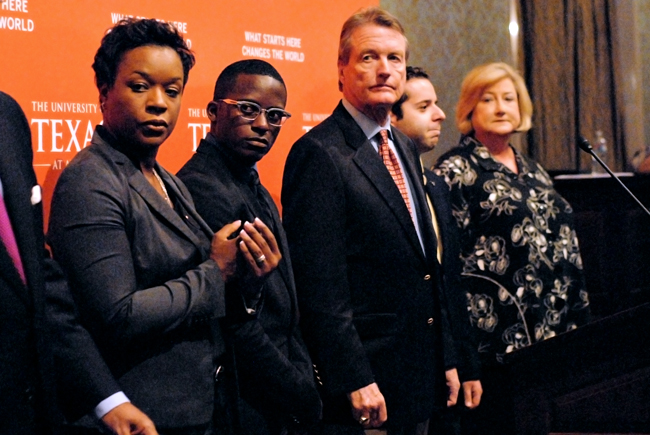Updated at 3:00 p.m.
Original Story
After a lengthy period of deliberation, the United States Supreme Court has avoided a sweeping ruling on the Fisher v. University of Texas case and instead ruled to send back the deliberation to a lower court for review.
In a 7-1 decision, the court has decided that the U.S. Court of Appeals for the 5th Circuit will be required to reexamine its opinion in Fisher after the high body found the Fifth Circuit had assumed UT had acted in "good faith" when applying race as a factor in admissions without applying strict scrutiny to its review. Justice Elena Kagan recused herself from the case, while Justice Ruth Bader Ginsburg issued the sole dissent.
In an opinion authored by Justice Anthony Kennedy, who has previously opposed the use of race as a factor in admissions in favor of other measures such as socioeconomic status, the court also upheld the compelling interest of racial diversity.
"The court must ultimately be satisfied that no workable race-neutral alternatives would produce the educational benefits of diversity," wrote Kennedy.
Kennedy's opinion made no mention of the goalpost set in Grutter suggesting public universities could cease using race as a factor in admissions after 25 years. Instead, the opinion only said the use of race in admissions at public universities remains a compelling state interest.
In a statement, President Williams Powers Jr. said he was "encouraged" by the court's ruling and that the decision would have no effect on the University's admissions process for the next class of 2018. The University has not yet scheduled a date for the Fifth Circut Court hearing, or decided which legal team will represent UT at the court, said Kedra Ishop, vice provost and director of admissions.
"We will continue to defend the University’s admission policy on remand in the lower court under the strict standards that the Court first articulated in the Bakke case, reaffirmed in the Grutter case, and laid out again today," Powers said, who added at an afternoon press conference that the University hoped to eventually strive to a point where the factoring of race was no longer necessary.
Abigail Fisher, who is white, initiated the lawsuit when she sued the University in 2008 claiming UT violated her right to equal protection when admissions considered her race as a factor in her application. At an afternoon press conference with Fisher on Monday, Edward Blum, director of the Project for Fair Representation, an organization that supports her position, said the court ruling was "a win" given the unusual conseus of the ruling.
"This ruling shows that universities that continue to use race based admissions will find themselves embrolied in polarizing and costly litigation," Blum said.
In her dissent, Justice Ginsburg argued UT had sufficiently explicated its use of race in admissions. Additionally, she argued the court should consider legacies of discrimination and historic inequality in calculating the compelling interest of race as a factor in admissions.
"Among constitutionally permissible options, I remain convinced, 'those that candidly disclose their consideration of race [are] preferable to those that conceal it,'" Ginsburg wrote.
The ruling was a victory for supporters of affirmative action, said David Hinojosa, regional counsel for the Southwest office of the Mexican American Legal Defense and Education Fund, a group that filed briefs on behalf of the University last summer.
"It's a great decision by the court reaffirming diversity as a compelling interest," Hinojosa said. "MALDEF expects to dilligently monitor case as it is remanded but we are confident that UT’s limited use of race in admissions will be upheld."
Student supporters of UT's use of race in admissions should feel similarly, said history senior Joshua Tang, head of a student initative to defend the University's admissions policy.
"The opinion from the court today is very interesting," Tang said. "We are very happy that affirmative action continues to be a compelling interest and that the University's current admissions process is continuing to go in effect."
Justice Antonin Scalia and Justice Clarence Thomas both wrote separate opinions concurring with Kennedy, but together argued the precedent of using race as a factor in admissions should be overturned. Glenn Ricketts, spokesman of the National Association of Scholars, which filed briefs on behalf of Fisher last year, said their organization agreed with that proposal.
"We'll have to see what happens, because this obviously isn't over yet," Ricketts said. "We hope the Appeals Court decides to rule on side of favoring individual merit in admissions and not any form of quotas."
Abigail Fisher did not qualify for admission to the University under the Top Ten Percent Law when she applied in 2008, a statewide mandate which automatically admits the top ten percent of in-state graduating high school seniors to Texas public universities every year. Instead, she applied under holistic admissions, which includes race, socioeconomic status, gender and other factors in the application. Fisher was admitted to UT under the CAP program, but instead chose to attend Louisiana State University.
During oral arguments, several justices questioned Fisher’s right to stand, contending she would not have been admitted to the University regardless of the use of race in her application because of her low admissions criteria. Fisher has since graduated from LSU and currently resides in Austin.
UT admits more white students than any other racial group under its race-inclusive admissions policy. Students admitted under race-inclusive admissions also come largely from households with incomes above $50,000.
Currently, the number of students admitted under the Top Ten Percent Law is capped at 75 percent of the incoming class, meaning 25 percent are chosen based on their race and other factors.
Related Content:
Supreme Court sends Fisher v. Texas case back to lower court"
"TIMELINE: Affirmative action in United States through the years"
"TIMELINE: History of Fisher v. Texas case"
"UT student body President Horacio Villarreal comments on Fisher ruling"
"5 quotes you got to see from the Supreme Court's ruling on Fisher v. Texas"
"Abigail Fisher, Edward Blum says Fisher v. Texas court decision is a 'win'"





















